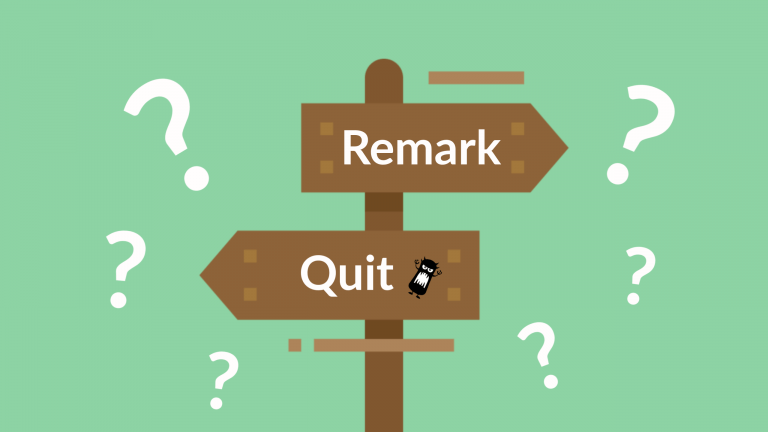
I failed the IELTS test, so what do I do now?
Every student who sits the IELTS test hopes to pass. Unfortunately, the sad truth is that not everybody does (at least not first time). So, what do you do when you don’t get the band scores you need? Well, there is no magic answer, but hopefully this short survival guide can offer some help and support to anybody in this position. Here are my 5 Steps To Recovery if you have failed the IELTS test.
1. Give yourself time to be upset
I’m not going to lie. Failing sucks. You worked hard. You spent time, money and effort preparing. You did your best, but now you are back to step one. Don’t try to pretend that everything is OK immediately – it’s not. Allow yourself some time to be upset. Some people like to cry, others like to comfort themselves, personally, I like to go to the park and shout! Whatever you have to do to release that sadness – do it. But only for a limited time. Wallow for a couple of days but then get back up and start again.
If you are struggling with feelings of failure, PLEASE listen to my interview with Psychologist Beverly Beverley A’Court who gives simple techniques for dealing with IELTS stress.
2. Be kind to yourself
I cannot tell you how important this is. Yes, you failed, but you are not a failure. IELTS is HARD. The average score for students in most countries is 6.0 – 6.25. If you are preparing to migrate to Canada and need CLB9 (8777), that means you need a score that puts you in the top 5% of all test-takers worldwide (seriously, that’s why you get those bonus 50 points!). The same if you are preparing for PLAB and need overall 7.5 (no less than 7 in each area) – these are HARD scores to get (particularly for writing and speaking).

Never let anybody make you feel ashamed of yourself for not passing this time (and definitely don’t make yourself feel this way!). You did your best and that is all anybody can ever ask of you.
And, if you chose to take the test, that means you want to improve your life in some way, and that is something to be respected. 99% of people just stay at home and do nothing.
You are trying to make a change in your life – and that can only ever be respected.
3. Honestly examine why you failed the IELTS test
Once you feel a bit better, the next step is honestly evaluating why you failed. If you got 6666 and you need 8777, the simple truth is that right now your current level of English just isn’t high enough to sit again immediately. That’s OK – don’t waste money on another test, spend it instead on lessons – find a local school where you can study some general English classes before you try again.

If you were very close to your target score (for example 0.5 bands away), first, read my blog post about when it is a good idea to apply for a re-mark. Think carefully about why you missed out this time:
- Were you unlucky with an essay question and had no ideas?
- Did you write off-topic in writing Task 2?
- Did you run out of time in the writing or reading tests?
- Did you get a tough topic for Speaking Part 2?
If you answered “yes” to any of these questions, you can probably book another test immediately. Luck is a big factor in IELTS and sometimes it can just not be your day. I have had many conversations with students that end with the simple but truthful phrase: “it just wasn’t your day”.
However, if you did your best and still didn’t get your scores, then it is probably time to get some help to find out why you failed.
There is no point booking another test until you know that you have fixed the problems from the last one.
If you struggle with reading and listening, start keeping a record of the questions you get wrong in these tests. Then, look to see if you can find a pattern.
- Do you always make mistakes with one type of question? For example, True / False / Not Given, or Headings Match, or Multiple Choice Questions. If so, read one of my blog posts to find out what skills are being taught here so you can start to fix them.
- Do you always make mistakes in one section of the test? For example, if you find Part 3 of the listening exam difficult, it probably means you find it hard to follow two or three speakers, so start listening to podcasts with more than one host (Radiolab is great for this)
- Do you always have problems with one particular topic? For example, do you struggle with readings texts about Psychology or Space? If so, go online and do some reading in these areas to familiarise yourself with typical lexis and subject matter.
However, if you have problems with writing or speaking, it is probably time to get professional help. A good teacher will be able to analyse your performances and tell you exactly why you aren’t currently achieving your band scores. I have a new “first assessment” service for writing, that does exactly this.
4. Prepare again (but properly this time)
PLEASE do not book another test until you have addressed the problems from the last one. It is NEVER a good idea to “just try”. I have worked with students who “just tried” 17 times before they woke up and looked for help – this is the road to depression and despair.
Now is the time to focus on improving your skills.
This does not mean doing endless practice tests! No, it means taking the results of Step 3 – finding out why you failed – and working on those weak areas until they become strengths. How long will this take? As long as it needs to! Skipping Step 4 means you will just be back at Step 1 again (which none of us want) !!!
We now offer 5-day intensive courses for reading, speaking and listening. These break down every type of question in the test and arm you with the skills needed to tackle them well. You can find out more here.

5. Try again
I think of IELTS like a driving test – not everybody will pass first time, but most people who are determined enough will get there in the end. If you focus on improving your language and academic skills, you will be able to pass in the future. And I promise you that once you do, all of this pain will disappear and IELTS will become just a small bump in your life path.

Is it time to stop?
I’d just like to point out that there is an alternative step 4, and that’s making the decision to stop your preparation. If you are genuinely feeling tired and depressed by your IELTS journey, then there is no shame in taking a month or two out, or even quitting altogether. Maybe there is an alternative exam that you can take? Or another life path that will bring you to the same goal in a different way.
If the thought of more study makes you feel sick, just stop. No regrets. No feeling bad. No looking back. Nothing is more important than your mental health.
If you are feeling down about your results and need some emotional support, feel free to message me any time. IELTS is never an easy road, but it feels better if you have somebody next to you for the journey 🙌
So, those are my 5 steps to take you from failure today to future success. Let’s summarise what we have learned:
5 Steps To Recovery if you have failed the IELTS Test
- Give yourself time to be upset – (failing sucks, don’t pretend it doesn’t)
- Be kind to yourself – you are taking steps to change your life, that makes you a winner not a loser
- Examine honestly why you failed – why did you fail this time, was it really bad luck or do you need to spend more time working on your language skills?
- Prepare again – do not even think about booking another test before you have taken steps to address the problems you faced in this attempt
- Try again – if you follow steps 1 – 4, then hopefully this time you will get the band scores you need and move forward to the next stage in your life 🚀
